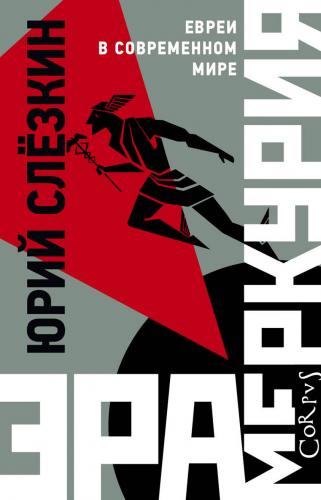9
Donald L. Horowitz. Ethnic Groups in Conflict. Berkeley and Los Angeles: University of California Press, 1985, 119; Casajus, Crafts and Ceremonies, 303; de Vos and Wagatsuma, Japan’s Invisible Race, 231; Werner Sombart. The Jews and Modern Capitalism. London: T. Fisher Unwin, 1913, 138; Gmelch, Groups That Don’t Want In, 322–323.
10
Joseph C. Berland, Kanjar Social Organization, in Rao, The Other Nomads, 253; Gmelch, “Groups That Don’t Want In”, 320–321; Anne Sutherland. The Body as a Social Symbol among the Rom, in John Blacking, ed. The Anthropology of the Body. London: Academic Press, 1977, 376.
11
Тайна Израиля: “Еврейский вопрос” в русской религиозной мысли конца XIX – первой половины XX в. (СПб.: София, 1993), 251. Все переводы без атрибуции сделаны автором.
12
Yuri Slezkine. Naturalists versus Nations: Eighteenth-Century Russian Scholars Confront Ethnic Diversity // Representations 47 (Summer 1994): 174, 180–182; Max Weber. Ancient Judaism. Glencoe, 111: Free Press, 1952, 351–355.
13
Vaughn, Caste Systems, 77–79; Sutherland, The Body, 378–380; Okely, The Traveller-Gypsies, 83–85; Axelrod, А Social and Demographic Comparison, 51–54, 61–62.
14
Матфей 15:11.
15
См. в особенности: Sutherland, The Body, and Luhrmann, The Good Parsi, 102; Max Weber. The Sociology of Religion. Boston: Beacon Press, 1963, 109; David Nemeth. Gypsy Taskmasters, Gentile Slaves, in Matt T. Salo, ed. The American Kalderas: Gypsies in the New World. Hackettstown, N. J.: Gypsy Lore Society, North American Chapter, 1981, 29–41.
16
Cм.: Okely, The Traveller-Gypsies, 8–19; and Paul Wexler, The Case for the Relexification Hypothesis in Romani, in Julia Horvath and Paul Wexler, eds. Relexification in Creole and Non-Creole Languages. Wiesbaden: Harrassowitz, 1997, 100–161. Очень полезный обзор см. в: Yaron Matras. Para-Romani Revisited, in Yaron Matras. ed. The Romani Element in Non-Standard Speech. Wiesbaden: Harrassowitz, 1998, 1–27.
17
Основные аргументы (в указанном порядке) см. в работах: (1) Sarah Grey Thomason and Terrence Kaufman. Language Contact, Creolization, and Genetic Linguistics. Berkeley and Los Angeles: University of California Press, 1988), 103f; (2) Ian F. Hancock. The Social and Linguistic Development of Angloromani // Working Papers in Sociolinguistics, № 38 (December 1977): 1–42; also Ian F. Hancock. Is Anglo-Romanes a Creole? // Journal of the Gypsy Lore Society 49, № 1–2 (1970): 41–44; (3) Norbert Boretzky and Birgit lgla. Romani Mixed Dialects, in Peter Bakker and Maarten Mous, eds. Mixed Languages: Fifteen Case Studies in Language Intertwining. Amsterdam: IFOTT, 1994, 35–68; and Norbert Boretzky. Der Romani-Wortschatz in den Romani-Misch-Dialekten (Pararomani), in Matras, The Romani Element, 97–132; (4) Peter Bakker and Maarten Mous. Introduction, and Peter Bakker. Michif, The CreeFrench Mixed Language of the Métis Buffalo Hunters in Canada, in Bakker and Mous, Mixed Languages, 1–11 and 13–33; and (5) Jakob Ladefoged. Romani Elements in Non-Standard Scandinavian Varieties, in Matras, The Romani Element, 133–164.
18
Olesen, Peddling in East Afghanistan, 36; Bollig, Ethnic Relations, 204, 214.
19
Casajus, Crafts and Ceremonies, 308–309; Bollig, Ethnic Relations, 214; Hancock, The Social and Linguistic Development, 29; Anthony P. Grant, Shelta: The Secret Language of Irish Travellers Viewed as a Mixed Language, in Bakker and Mous, Mixed Languages, 135–136; R. A. Stewart Macalister. The Secret Languages of Ireland, with Special Reference to the Origin and Nature of the Shelta Language. Cambridge: Cambridge University Press, 1937, 132.
20
Цитируется в Macalister, The Secret Languages, 134–135.
21
Solomon A. Birnbaum. Yiddish: A Survey and Grammar. Manchester: Manchester University Press, 1979, 76, 106.
22
Max Weinreich. History of the Yiddish Language. Chicago: University of Chicago Press, 1980, 95–124.
23
Paul Wexler. The Ashkenazic Jews: A Slavo-Turkic People in Search of a Jewish Identity. Columbus: Slavica, 1993, 59–60 and passim; Dell Hymes. Introduction, in Dell Hymes, ed. Pidginization and Creolization of Languages. Cambridge: Cambridge University Press, 1971, 76, 77–78, 86–87 (цитата взята со с. 86); см. также: Іап F. Hancock. Recovering Pidgin Genesis: Approaches and Problems, in Albert Valdman ed. Pidgin and Creole Linguistics. Bloomington: Indiana University Press, 1977, 277–294, esp. 289–290, and Ian F. Hancock, Appendix: Repertory of Pidgin and Creole Languages, там же, 385.
24
Birnbaum, Yiddish, 82 and passim; Weinreich, History of the Yiddish Language, 29, 350–351, 599f and passim; Joshua A. Fishman. Yiddish: Turning to Life. Amsterdam: John Benjamins, 1991, 19–35, 189–201.
25
О категории “смешанных языков” см.: Bakker, Michif, 25–26. Нет сомнения, что с точки зрения грамматического строя и словарного запаса идиш – германский язык; уникальными (среди германских языков) являются история его возникновения и функционирование.
26
Matras, Para-Romani Revisited, 21; Yaron Matras. The Romani Element in German Secret Languages, in Matras, The Romani Element,
